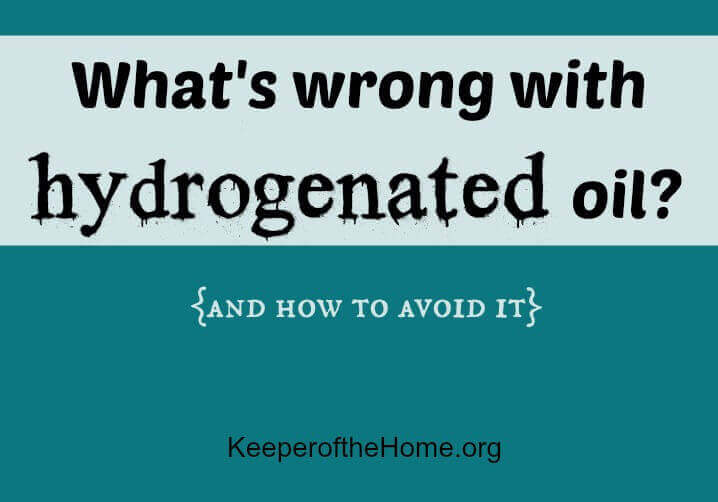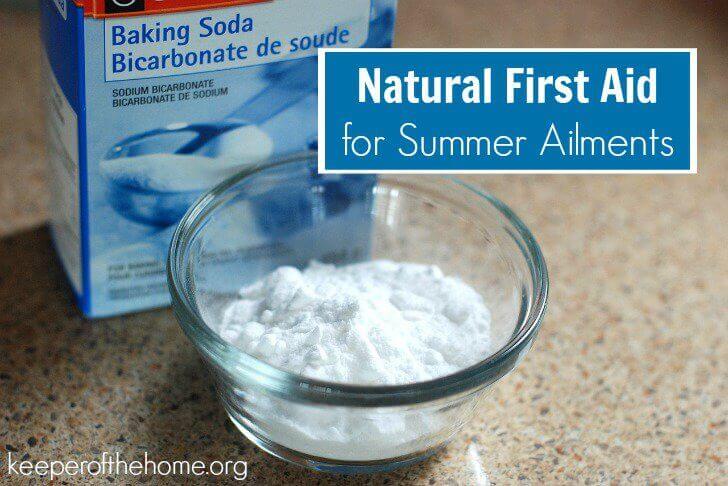What’s Wrong with Hydrogenated Oil (and How to Avoid It)

By Stacy, Contributing Writer
While many oils are healthy and nourishing to the body and brain, hydrogenated oil is not one of them.
You’ve probably heard that hydrogenated oil isn’t good for you, but perhaps you are not sure why.
I always find it easier to stay away from foods that are unhealthy when I understand why they are bad for me. It also helps to know suitable replacements.
Today we will examine hydrogenated oil to get a better understanding of why it is unhealthy and what we should use instead.

image by nuzree
What is hydrogenated oil?
Hydrogenated oil is a liquid oil which as been turned into a solid or partially solid state through the process of hydrogenation.
The process of hydrogenation usually involves injecting oil with a metal (such as nickel or aluminum) in order to extend the shelf life of oil and also to make a liquid oil into a solid form (like margarine).
Many oils are quite healthy before going through the process of hydrogenation. In their natural state, the oils are unsaturated fats, which are better for us. Once hydrogenated, these oils actually change their structure and become trans fats.
For more information on the history of hydrogenation, click here.
What’s wrong with hydrogenated oil?
Natural News reports that the molecular structure of hydrogenated oil is more like plastic than oil and that consuming it actually thickens blood. (Source)
When consumed, hydrogenated oils (trans fats) are often stored as fat, but this is not the only problem with them. According to Nina Plank, in Real Food, What to Eat and Why, trans fats do the following:
(This list is slightly adapted from the one in her book.)
- Lower HDL (good cholesterol)
- Raise LDL (bad cholesterol)
- Raise Lp(a), which promotes atherosclerosis (plaque build up in arteries) and clotting
- Reduce blood vessel function
- Promote obesity, diabeties, and hypertension
- Alter fat cell size and number
- Reduce cream in breast milk
- Reduce fertility
- Increase asthma
- Reduce immune response
- Interfere with conversion of DHA and EPA
- Disrupt enzymes that metabolize carcinogens and drugs
- Damage cell membranes
- Create free radicals
Trans fats (produced via the process of hydrogenation) are most often linked to heart attacks.
The detrimental effects of these oils is even being recognized by the FDA; in Novemeber, 2013 they declared:
“The U.S. Food and Drug Administration announced its preliminary determination that partially hydrogenated oils (PHOs), the primary dietary source of artificial trans fat in processed foods, are not “generally recognized as safe” for use in food. The FDA’s preliminary determination is based on available scientific evidence and the findings of expert scientific panels. ”
See the full press announcement.

image by AndAll
Foods containing hydrogenated oil
According to WebMD, trans fats (hydrogenated oils) are found in 40 percent of products on supermarket shelves.
Some of the most commonly consumed foods, which use hydrogenated oils (or trans fats) are:
- margarine
- shortening
- peanut butter (not all brands)
- cereal bars
- coffee creamer
- cookies
- cake mix
- salad dressings
Sneaky names for hydrogenated oils
When reading food labels, we need to know a few things. Food manufacturers are adept at hiding ingredients by listing them under names many people don’t recognize.
Stay away from products with the following:
- hydrogenated
- partially hydrogenated
- interesterified (learn more about interesterification)
- shortening
How to Avoid Hydrogenated Oil
When purchasing pre-made items, read labels and chose natural products without trans fats, hydrogenated oils, partially-hydrogenated oils, interesterified oils and/or shortening.
Do not use margarine or shortening. Replace margarine with butter. Replace shortening with butter, palm oil or coconut oil.
To learn more about baking with coconut oil, see: How to bake with coconut oil.
Whenever possible, stick with home baked goods over store-bought; that way you can control the ingredients.
Instead of purchasing salad dressings, make your own (this balsamic thyme dressing is my favorite).
Avoid fast food. Most fast food is bad for us and goes beyond the issue of hydrogenated oil.





Great article, Stacy – I was especially glad to see you list interesterified oils. I’ve been so annoyed by the increasing use of these by food manufacturers as consumers have become more savvy about avoiding hydrogenated/partially hydrogenated ingredients.
The day when trans fats are totally out of our food supply chain will be a good day, but long overdue. It’s articles like this and people making a noise and just no longer buying the stuff that might ensure that that day comes, hopefully soon. The FDA has recently proposed to phase out use of partially hydrogenated oils. It seems to be going in the right direction.. let’s see.
Thanks for this post! I recently read Real Food Basics and Kate T talked about this as well – it’s really changing the way I oil things before cooking, whether in the ingredients or for frying. I stopped using margarine a while ago, knowing that it was basically plastic – yuck. It might be a little less spreadable, but my stick of butter is the way to go. Thanks for writing this post to help us all understand a bit more!
Thank you so much for sharing this. Super informative!